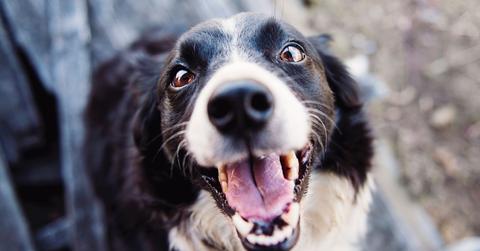Honeybees Are Being Saved By Dogs Trained To Sniff Out Bacteria
It's challenging and laborious to detect this bacteria that decimates bee populations, so an apiary inspector trained a dog to do it. They're amazing.
Updated May 31 2019, 11:58 a.m. ET
The Maryland Department of Agriculture is responsible for leasing out commercial colonies to states all over the U.S. Hives travel from Maryland as far as California to help pollinate the crops that are, in turn, shipped across the country.
Before a hive can cross state lines, it must be certified as being free of "foulbrood," a deadly bacteria. That job goes to Cybil Preston, the chief apiary inspector.
Foulbrood has no effect on humans, but it can transfer quickly from one hive to another. An outbreak can be devastating.
“Everything else that can go wrong with the hives is fixable,” Preston told the New York Times. “But not that.”
A few years ago, Preston began experimenting with a new way to detect evidence of the bacteria. She started training her Labrador retriever, Mack, to sniff for the foulbrood as they walked through the Maryland apiaries.
According to Preston, Mack can check twice as many hives as four people working full-time. The big time-saver is that a human must open a hive and check for evidence of foulbrood death. Mack can just take a sniff, and he'll know.
Preston's experiments with Mack have been so successful, she recently received a grant through the federal farm bill, which will allow her to train other dogs and potentially expand into other states with her techniques.
Those techniques basically had to be developed on-the-go, but she conferred with the head of the K-9 unit at the state’s Department of Public Safety and Correctional Services.
She was advised to choose a dog who was toy-obsessed for the work. At this point, she's working to train a second dog, Tukka, using the same techniques she tried successfully with Mack.
First, she plays with the dog using a toy soaked in foulbrood bacteria, to get the dog familiar with the scent. The next step is a rubber toy with the bacteria inside it, which she throws a distance or hides, to see if the dog can still find it.
Finally, the toy will be hidden in a training relay she designed that simulate beehives, a series of tubes and palettes at different heights. She wants to see if the dog can find the scent in a similar scenario as it will face in the field.
With Mack, Preston said the training took about nine months, and one of the most challenging aspects was learning to trust his findings. It would be a big deal if they made a mistake.
Bee populations have been in serious decline because of a number of factors, but colony collapse is often attributed to the decimation caused by bacteria. An empty hive that had its occupants killed off will soon be ransacked by a new hive, who will then bring back honey filled with the foulbrood to their healthy colony, spreading the illness.
Preston's responsibility, and now Mack and Tukka's, is a serious one.
“I had to learn to trust him,” Preston said.
Preston didn't invent the idea of using dogs to detect bacteria strains. In fact, there was a program in Maryland, which had been in place since the 1980s. But both the dog's handler and the dog had retired. Preston had to start over. She doesn't mind.
“All beekeepers are having trouble keeping their bees alive,” she said. “If they’re putting the effort in, I want to put the effort in.”
